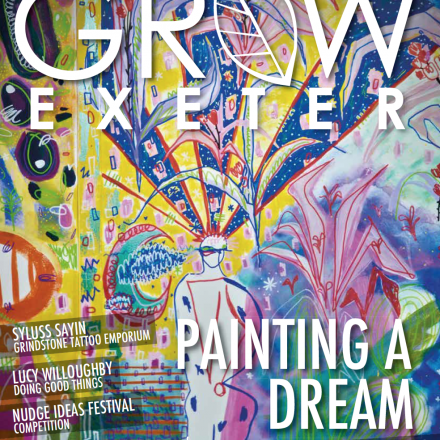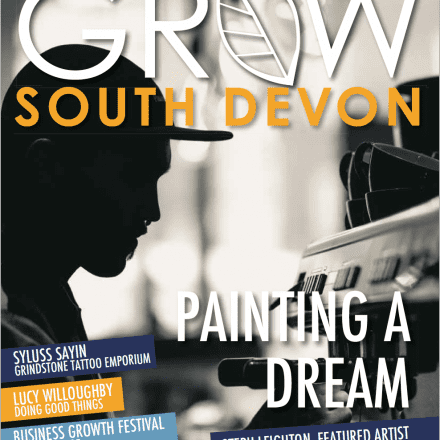
Toby Buckland; A GRASSROOTS MOVEMENT
Written by Joff Alexander-Frye and photography by Pip Andersen
Let’s try a self-reflection exercise together.
Firstly, let’s close our eyes (if it isn’t too awkward to do so wherever you are reading this). PAUSE.
Ok, now attempt to cast your mind back over your life and pick out a key person who has inspired you, captured your attention, motivated you or made you want to live life a better way. PAUSE AGAIN.
Now that you have that person’s face in the forefront of your mind, start to reflect on how that person made you feel. PAUSE FOR A THIRD TIME.
And finally, bring to mind some of the ways that you changed your attitudes, behaviours or values because of that person’s influence on your life. ONE FINAL PAUSE.
What we have just done together is a simple, bite-size exercise in thankfulness and mindfulness. But “Why start an article like this?” I hear you ask. Well, the answer is simple. Because I met such a person a few weeks ago.
Toby Buckland, born and raised in Exeter, has established himself as a leading expert in horticulture and ethno-botany (how people and plants interact and can co-exist with mutual benefit). His passion for life is truly contagious and his knowledge and insight into environmental issues is unique, intriguing and truly inspirational.
On a sunny afternoon a few weeks ago, Toby and I met for a chat ahead of the launch of our Grow Green initiative, where he was to be our keynote speaker and front-man. I wanted to understand a little more of his back story, where his passion for the environment came from and how Exeter might think about becoming more environmentally conscious and forward-thinking as it faces growth-related environmental challenges.
What ensued was an absolute treat for me - a two-hour conversation filled with laughter, education and inspiration. For example, during a walk around Southernhay, I learned about some of the trees that we passed, my favourite of which was Parrotia Persica – or Persian Ironwood - which ancient armies would have used to make spears due to its toughness.
I came away with a fire in my belly to care more for the world around me as well as a residue of the love-for-life that Toby embodies so powerfully.
So, without further ado, let me share the highlights of our conversation with you.
Good afternoon Toby. Thanks for carving out time for me in your busy schedule and for agreeing to be the ‘front man’ for our Grow Green campaign. We’re delighted to have you on board! Let’s start by talking a little about your upbringing and background?
Thanks for asking me to be involved Joff – a really worthy cause. Well, I was born right here in Exeter – in the old RD&E hospital before it was demolished and rebuilt. I was the youngest of three children and grew up in our family home in Dawlish, where I also went to school.
I felt a bit like a boat that was adrift during my time at school. I had a strong desire to see the world but had never been abroad. I would sit and daydream about travelling to far away places and of all the sights, sounds and smells I might find there. I’ve always been a curious being and I had this ‘taste for the exotic’ that I wanted to explore.
Our family had a building business which my uncles ran, and they said to me that there was a place in the business for my cousin and my brother, but not for me. Some people might think that a bit unkind but, honestly, it was a relief to me as it meant that I felt no pressure to live up to my family’s expectations and to do things a certain way.
This freedom, coupled with my desire to travel, meant that, at the age of just 17, myself and a close friend from school hitch-hiked to Israel. We found that, pre-dominantly, the main things that people abroad cared about were what religion we were and what we ‘did’. Of course, at the age of 17, not many people have a strong sense of ‘what they do’ in life, but I found myself telling people that I was a gardener due to the gardening jobs I had done during my teenage years.
So how long did you stay in Israel then?
We stayed there for a few months doing some gardening work before we moved on to Bavaria (near Lake Bodensee) and, from there, I moved to America to continue my learning and experience of gardening. I know there is a modern trend for ‘trust-fund-hippies’ to travel the world in their late teens, but my friend and I lived in slums and saw the grotty side of the world. It didn’t half make me realise how lucky I was to have grown up in Devon. It was a very tempering experience.
By this stage, I was 19 and wanted to consolidate the experience I had gained of my trade – after all, it is all well and good saying you are something, but sometimes you need the qualifications or certificates to prove it! So, I moved back to Devon and attended Bicton College where I worked towards a City & Guilds qualification. Once I had achieved that, I studied full-time at the college and gained my National Certificate, probably the best horticultural course that I have ever done. It was really broad and was taken very seriously as, at the time, there were no other academic qualifications available for people interested in horticulture.
We learned a mixture of traditional and modern practices, ranging from ‘hedgerow crafts’ such as water-divining to more modern horticultural practices like responsible chemical-spraying, tractor driving and chainsaw handling.
My studies at Bicton also started my intrigue and enjoyment of identifying plants and learning their traditional Latin names. I’m not very good with people’s names but I could tell you pretty much any plant name out there! This stood me in excellent stead for my future endeavours.
So, what happened next?
I moved to Kent and attended a campus of Greenwich University to study Amenity Horticulture & Landscape Design. That sounds fancy but, essentially, it is to do with the management of green spaces and, in particular, city parks.
Gardening isn’t really about plants at all. It’s actually about the relationship between plants and people. In order for urban spaces to be beautiful places to live, there is a necessity for plants and people to benefit each other. That’s what real garden design is. It isn’t a ‘high art’ but, rather, is meant to grab your attention and capture your imagination.
At this time, the exploration of merging urban and rural environments was really avant-garde and thought-leading. It was an absolute pleasure to be learning about it at such an exciting and innovative time in the world of horticulture.
And what about your move into the worlds of TV and radio?
It was actually a former college lecturer who first contacted me to tell me that Channel 4 needed a horticultural researcher for a show. I went along to the interview and they asked me all sorts of broadcasting questions, which I had no idea about. How to draw in an audience on a Tuesday afternoon and that sort of thing. I knew the interview had gone very badly but, on the way out, I said to them “I might not know how to draw in an audience, but if you take me to any garden, I’ll be able to tell you what everything is and what could be growing there that isn’t already.”
That was the one skill that no other candidates had and, within a few hours, I had been called with a job offer! Although excited to accept the role, it was daunting as I had never worked in offices before and didn’t really know how to ‘play the game’.
It was the early days of Sky TV and I went on to work with the likes of Richard Hammond, Raymond Blanc and Claudia Winkleman on a specialist channel called Granada Breeze. I still see them from time to time at events and reminisce about the old days!
From there, I learned my craft, went on to host live shows and eventually moved into terrestrial TV where I had a Channel 5 series with Claire Bradley (the Blue Peter gardener), my own BBC 1 gardening series and then presented Gardeners World on BBC 2. I also present from the Chelsea Flower Show each year and analyse the beautiful gardens at Hampton Court and Tatton Park too.
I had previously run the plant nurseries at Powderham Castle but sold that to an Exeter company called Urban & Rural Plants and, on the day that I left, had an idea for a radio show. I phoned in to the boss at Radio Devon and this started a conversation which escalated into the Sunday morning show that I now present.
And what about your passion behind environmental care and ‘being green’?
Well, at a simple level, it is a bi-product of my upbringing and education. I think that there is a growing realisation and ownership of the fact that we need to change the value that we place on living organisms and plants. The recent episode of Blue Planet 2 and the subsequent surge of activity and conversation about reducing levels of ocean plastics is one example of this trend.
Another subject that seems to have gathered some traction in recent months is the fact that populations of bees are reducing at an alarmingly fast rate in parts of the world. We are realising that to care for our wildlife more compassionately, we need to care for, nurture and invest in our green spaces first.
This counteracts the trend of the 50’s, 60’s and 70’s that I call the ‘Star Trek Mindset’ – to conquer, control and dominate nature. This was an accurate reflection of the widely-held beliefs and approaches to environmental care in society at that time.
To fast-forward to the modern day, there is an accepted belief that it is increasingly the community’s responsibility to care for it’s green spaces. With government organisations shorter on cash than ever before, there is an acceptance that certain green spaces need to grow wild and, actually, in some cases, this is better for the local populations of insects and animals.
So, how can communities, particularly here in Exeter, start to make a real and lasting difference to the parts of the planet that they are responsible for?
It is all about small and consistent changes. People get scared or disheartened when they think about large, wholesale change.
I think of our city as a large knot. It is a tangle of roads, communications infrastructure, houses, businesses and green spaces…all tangled up in a knot that has formed over decades of development in the city. As with any knot, when you pick away a bit of it, what seems like impossibly tangled strands that are tied together, will loosen up and eventually become untangled.
If we think about some of the easy wins and pick at them one at a time, we can start to make real, significant progress in Exeter becoming a greener and cleaner place to live and work.
The business community taking a lead in this process is absolutely vital as they are connected, have influence and can become agents for change in our city. They can get things moving which, then and only then, others can follow. Businesses in our city have an opportunity to become visionaries and accelerators in a grassroots environmental movement in Exeter.
And what if we don’t step up to the mark?
Well, I don’t think that is an option really. Every generation has its own responsibility and, effectively, will one day be remembered for it’s very best, or very worst actions. I believe that my generation is the last generation that widely values practical skills, for example. Your generation is probably the first generation of true ‘Tech Natives’ who are completely conversant with modern technology.
I observe a very real shame that exists in many people’s mindsets nowadays. A shame of how far down the slippery slope of destroying our planet we have come. I hope and believe that there is a genuine desire to ‘right that wrong’.
But to do this, joined-up-thinking, sacrifice and mindfulness are hugely important.
And, I think, Exeter has the opportunity to become a leading light in the region, the country and even the world on environmental issues. The power is in our hands, it is just a question of whether we will use it for good or for bad.










